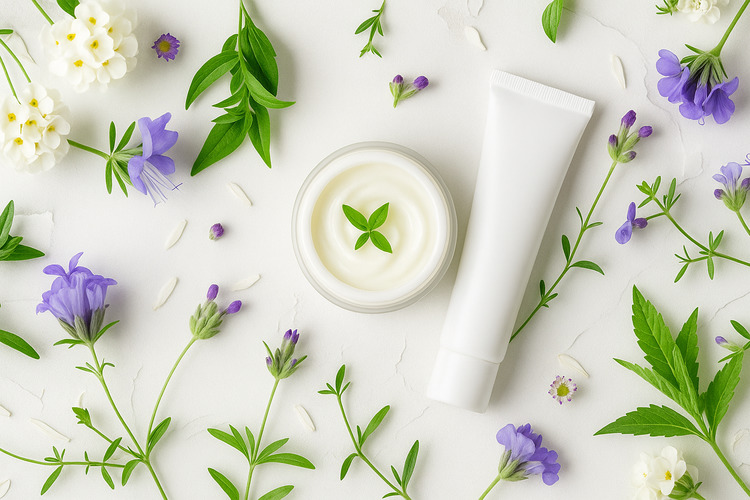Buying facial skincare products can be a challenging task, especially if you have sensitive skin. What gives others a radiant, healthy appearance can cause irritation, redness, or itching for someone else.
To make choosing cosmetics easier, it’s important to know which ingredients to avoid. Read on to learn which components can be harmful to sensitive skin.
What is sensitive skin?
Sensitive skin is characterized by increased reactivity and vulnerability to external irritants—such as environmental factors, cosmetic ingredients, diet, and lifestyle. It is more prone to atopic dermatitis and other skin conditions. Even normal skin can temporarily become sensitive, showing signs of irritation when its protective barrier is compromised. If you know you have sensitive skin, it’s especially important to focus on restoring it, calming inflammation, and minimizing contact with triggering factors.
It’s important to distinguish between sensitive and sensitized skin. Sensitized skin is an acute condition of irritated or inflamed skin. Sensitive skin can easily become sensitized, but even normal skin can sometimes be sensitized due to environmental stressors, harsh cosmetics, excessive exfoliation, or abrasive treatments.
Ingredients to avoid for sensitive skin
1. Alcohol
This may not come as a surprise, but it’s remarkable how many cosmetic products contain alcohol. Some types, such as fatty alcohols derived from coconut or palm oil, can indeed nourish and soften the skin. However, most of the time, alcohol in cosmetics serves a different purpose: it acts as a solvent, speeds up the drying of toners and astringents, and helps other ingredients penetrate the skin.
The problem is that alcohol can strip the skin of its natural oils and disrupt its protective barrier, leading to dryness and irritation. To avoid this, opt for moisturizing toners with glycerin or hyaluronic acid—they care for the skin without disturbing its natural balance.
2. Fragrances

If you have sensitive skin, it’s best to avoid cosmetics with fragrances. While fragrances make products more pleasant to use, they often cause skin irritation, including allergic contact dermatitis. Opt for fragrance-free products. Keep in mind: “fragrance-free” does not always mean the formula is completely natural — sometimes these products contain masking agents to cover odors.
Tip: Also avoid cosmetics with colorants. Colorants give products a bright and appealing appearance but often cause irritation. For sensitive skin, choose products without colorants to minimize the risk of adverse reactions.
3. Essential Oils
Essential oils can have a soothing effect in some situations; however, when applied directly to the skin, the effect can be the opposite. Oils such as tea tree or lavender are extracted from plants and valued for their scent or potential skin benefits. In concentrated and purified forms, they can cause allergic reactions, irritation, or increase sensitivity in some people. Therefore, it’s important to perform a patch test before using any essential oil. Natural doesn’t always mean safe.
Essential oils add a pleasant aroma to cosmetics but are also often a cause of irritation.
Essential oils add a pleasant aroma to cosmetics but are also often a cause of irritation.
4. Sulfates
Sulfates are often added to cleansers to create foam. While this effect can feel pleasant and look appealing, these ingredients actually do more harm than good for the skin. Sulfates effectively remove dirt and sebum, but for sensitive skin, they can be too harsh, causing dryness, irritation, and disrupting the skin’s natural protective barrier.
How to recognize sulfates in the ingredients list? The most common types are sodium lauryl sulfate and sodium laureth sulfate. There are milder surfactants, such as sodium lauroyl glutamate and sodium lauryl sulfoacetate, which gently cleanse the skin and break down easily in nature.
The optimal choice is a gentle sulfate-free cleanser containing cocamidopropyl betaine. It cleanses the skin delicately without disturbing its natural barrier.
5. Benzoyl Peroxide
If you have acne-prone skin, benzoyl peroxide can be a real ally. When used correctly, it effectively combats inflammation and breakouts. However, experts advise using it cautiously to avoid irritation. Sensitive and reactive skin often responds to active ingredients with increased breakouts. If benzoyl peroxide causes a negative reaction, products containing zinc can be a good alternative—they help reduce inflammation and decrease the number of pimples.
6. Retinols and Retinoids
Although retinol and retinoids can have a positive effect on the skin—sometimes even stronger than any other potentially irritating ingredient—it’s crucial to know how to use them correctly to achieve results without unwanted irritation. Retinols and retinoids, classic anti-aging ingredients, can cause redness, peeling, and burning—phenomena known as retinoid dermatitis, a form of irritant contact dermatitis.
Over time, many people find a suitable routine for these ingredients. However, some cannot: even when introducing retinol or retinoids gradually, irritation may occur, preventing regular use needed to achieve the desired effect. In such cases, it’s worth looking into products containing bakuchiol—a plant-based ingredient that is gentler than retinol but is believed to have similar anti-aging benefits.
7. Parabens
Parabens help extend the shelf life of cosmetics and prevent the growth of bacteria and mold. However, their preservative properties do not always align with skin safety. If you are prone to atopic dermatitis or suffer from eczema, parabens may cause irritation. Additionally, they are considered endocrine disruptors, mimicking the effects of estrogen and potentially affecting the body’s hormonal balance.
For this reason, it is recommended to choose products labeled “paraben-free,” especially lotions, makeup, and other skincare products. Pay attention to the most common types of parabens—methylparaben, ethylparaben, propylparaben, butylparaben, isobutylparaben, isopropylparaben, and benzylparaben—and avoid using products that contain them.
8. AHA (Alpha Hydroxy Acids) and BHA (Beta Hydroxy Acids)
AHA (alpha hydroxy acids) and BHA (beta hydroxy acids) are chemical exfoliants, so it’s important to use them with caution.
AHA and BHA dissolve the “glue” that holds dead skin cells on the surface, stimulating skin renewal and making the skin smoother and more radiant. However, these acids can cause irritation, redness, and increased sensitivity, so they are not recommended for sensitive or already inflamed skin.
For such cases, it’s better to choose gentle enzymatic exfoliants, for example, those containing pumpkin or pineapple, or mild scrubs based on jojoba or rice powder. Another excellent alternative is polyhydroxy acids (PHA), such as gluconolactone, which gently exfoliate, hydrate the skin, and are suitable even for the most delicate skin.
Facial Skincare Products


